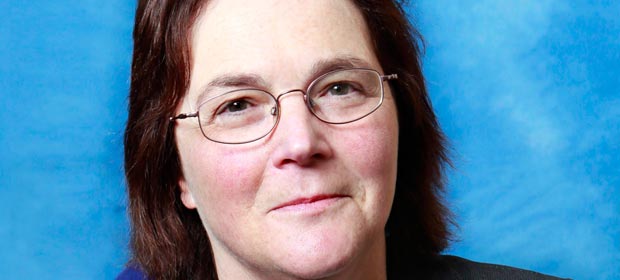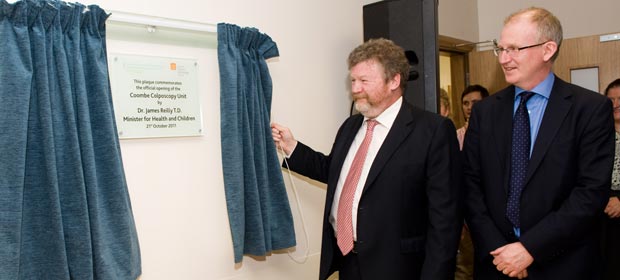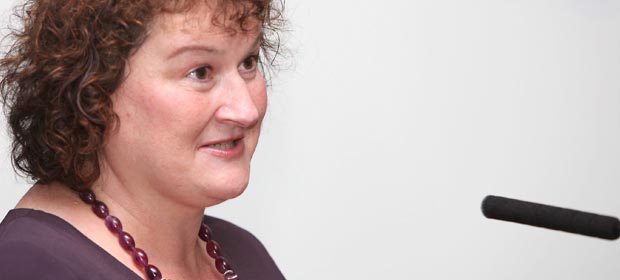A winner again!
Padraig Ryan, sustainability officer, the Children’s University Hospital, Temple Street, Dublin, who received the Green Dragon Business Award for the hospital pictured with Irish entrepreneur, competition judge and ‘Dragon’ Bobby Kerr.

The Green Dragon Competition recognises a hospital’s sustainability programme and showcases green initiatives of organisations across all industries.
New Director of Finance for Beaumont

Mr Brian Keane has been appointed Director of Finance for Beaumont Hospital, Dublin.
He trained in KMPG and is a Fellow of the Institute of Chartered Accountants in Ireland.
He formerly held a number of Chief Finance Officer and Financial Controller positions within the public and private health systems.
He was CFO of UPMC Beacon Hospital, Dublin, CFO of The Hermitage Medical Clinic, Dublin and Financial Controller of the Rotunda Hospital, Dublin.
The protection of health records
Knowing how to protect peoples’ personal health information, in a way that ensures highly sensitive health records are stored and used properly, is covered in a new guide published by the Health Information and Quality Authority.

“The recent documented cases where people’s personal records have been found in bins and bogs is evidence that private information is being lost and/or disposed of inappropriately. This is unacceptable and leads to a breakdown of people’s trust,” said Professor Jane Grimson, Director of Health Information with HIQA.
What You Should Know about Information Governance: a Guide for Health and Social Care Staff provides information and guidance for people working in health and social care services to support good management of personal health information.
“Ultimately, any organisation providing health or social care should be able to clearly show that it can be trusted to maintain the confidentiality and security of the personal information of its patients,” Professor Grimson said. “Good information governance is a core component of safer better healthcare. It is not something that takes place in isolation, or separate from healthcare provision, but underlies safe effective care,” said Prof. Grimson.
HIQA’s new Guide gives practical information for health and social care providers around the management of information. The Guide is accompanied by a self-assessment tool which is designed to highlight areas where urgent action is required or where improvements may be made.
Healthcare is information-intensive, creating a huge amount of data, including patient records and test results, every day. It is estimated internationally that almost 30 per cent of the total health budget is spent on handling information, collecting it, looking for it or storing it.
Minister opens Colposcopy Unit
The Minister for Health, Dr. James Reilly, T.D., has opened a new purpose built Colposcopy Unit at the Coombe Women and Infants University Hospital (CWIUH). The improvement of Irish colposcopy services has been a key priority for CervicalCheck – The National Cervical Screening Programme – and the unit, which was jointly funded by the CWIUH and the National Cancer Screening Service, will ensure that women with a screen-detected abnormality are provided with optimum care. CervicalCheck celebrated its third birthday in September and since its launch has proved successful with on average 1,000 women availing of a free smear test per day.

The CWIUH is one of 15 publicly funded colposcopy services which support the CervicalCheck programme. The new colposcopy unit at the hospital consists of spacious reception and waiting areas, four fully equipped air conditioned clinical rooms with en-suite changing facilities, clinical/administrative support spaces, a multidisciplinary clinical teaching/training room and dedicated parking. The new colposcopy unit will accommodate approximately 1,500 new attendances per annum with a capacity to increase the numbers.
As a result of the CervicalCheck programme, there has been an increase nationally in the numbers of new patients who attended colposcopy services nationwide. Between 1 September 2009 and 31 August 2010 16,811 women attended a colposcopy appointment for the first time. The numbers of women undergoing treatment similarly increased during the same period to 7,546 in 2009-2010 with 95 per cent of these treatments being performed as an outpatient using local anaesthetic. In the second year of the programme 145 cancers were diagnosed and over 5,500 high and low grade pre-cancerous abnormalities were diagnosed. There has also been a significant reduction in waiting times for women requiring access to a colposcopy service. The NCSS has set strict guidelines for referral to colposcopy with a commitment to offer an appointment to women who need it, at a quality assured colposcopy service within two weeks for urgent referrals, four weeks for high grade cell changes and eight weeks for low grade cell changes. Latest figures (September 2011) for waiting times for the 15 colposcopy services that support CervicalCheck are : 1.5 weeks for urgent referrals (within the 2 week target). 3.4 weeks for high grade referrals (within the 4 week target) and 6.6 weeks for low grade referrals (within the 8 week target).
New Institute launched
The All Ireland Institute of Hospice and Palliative Care (AIIHPC) has been officially launched in Dublin and Belfast.
The Dublin launch was attended by the Minister for Disability, Equality, Mental Health and Older People, Kathleen Lynch T.D. and the Belfast launch by Edwin Poots, Minister for Health, Social Services and Public Safety.

Minister Lynch said that a total of 6,000 people would access hospice care this year and this figure would double by 2014.
Mo Flynn, Chief Executive, Our Lady’s Hospice and Care Services and Chair of the AIIHPC’s Management Committee said AIIHPC was comprised of a Consortium of twelve partner organisations, including health agencies and universities, all working to improve the experience of supportive, palliative and end-of-life care on the island of Ireland through education, research and policy development and implementation. The Institute’s work would focus in three strategic work areas – education, research and policy and practice.
Through committed stakeholder involvement across the sector, the Institute aims to make meaningful, evidence-based contributions to the education, research and policy environments, North and South. The Institute’s belief is that a collaborative and comprehensive approach will deliver a better experience for patients and their families. The ultimate aim is to secure best care for those approaching end of life. The concept of an all-island Institute was first identified and explored back in 2007. While much positive work was underway, it was felt that a more collaborative approach would yield better results.
The Irish Hospice Foundation commissioned a report into the need for such an all-Ireland Institute and following this, the twelve current AIIHPC partner organisations collated a bid to secure the establishment of the Institute. Having secured funding from The Atlantic Philanthropies, as well as additional funding from the Irish Hospice Foundation, Irish Cancer Society, the Health Research Board and Research and Development Division of the Public Health Agency, the All Ireland Institute of Hospice and Palliative Care was born.
Leading the team at AIIHPC is the Director, Paddie Blaney, supported by the Head of Research, Dr Sonja McIlfatrick and the Head of Education, Michael Connolly. The Institute will work with stakeholders across the sector to drive innovation and improvements to service provision, whilst also fostering greater understanding amongst the people of Ireland and Northern Ireland around issues related to death, dying and loss. The Department of Health and the HSE will continue to liaise closely with all relevant stakeholders to enhance all aspects of Palliative and End-of-Life care in the future.
Consortium Member Organisations are Dublin Academic Medical Centre (DAMC), Marie Curie Centre, Belfast, Milford Care Centre, Limerick, Northern Ireland Hospice, Our Lady’s Hospice and Care Services, Dublin, Queen’s University Belfast, St Francis Hospice, Raheny, Dublin, St James’s Hospital, Trinity College Dublin, University College Dublin, University of Limerick, University of Ulster.

